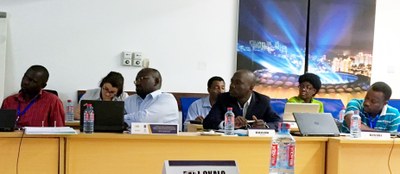GEMNet-Health Innovates Model for Its Trainings
 A recent training workshop on impact evaluation of health programs, held in July in Accra, Ghana, showcased a new model for joint trainings conducted by a network of regional training institutions.
A recent training workshop on impact evaluation of health programs, held in July in Accra, Ghana, showcased a new model for joint trainings conducted by a network of regional training institutions.
The Global Evaluation and Monitoring Network for Health (GEMNet-Health), supported by MEASURE Evaluation, which is funded by the United States Agency for International Development (USAID), tested its joint training revenue-sharing policy at the 11-day workshop. It also turned over more teaching responsibility to network members and gained high marks from participants.
One objective for GEMNet-Health and its training efforts is for MEASURE Evaluation instructional support to be gradually reduced over time, as GEMNet-Health instructors take on increasing teaching responsibilities. The ultimate goal is for GEMNet-Health member institutions to offer specialized training programs independently, through pooled expertise. This workshop took the network a long way toward those goals.
For the first time, in addition to covering venue and administrative expenses incurred by the host institution, revenue from workshop fees also covered the workshop honoraria, travel, and in-country expenses for its instructors, other than those for MEASURE Evaluation. The majority of surplus revenue was allocated to the host institution; the remainder will be allocated to GEMNet-Health activities, according to the network’s revenue sharing matrix.
“The deep commitment shown by all the GEMNet-Health member institutions to take a long-term, broad perspective to appreciate potential benefits for GEMNet-Health is laudable,” says Hemali Kulatilaka, MEASURE Evaluation’s senior technical specialist for capacity building and one of the workshop planners.
“For me, it was a wonderful opportunity to co-lead such a highly successful workshop,” says Justice Nonvignon, PhD, senior lecturer, University of Ghana, School of Public Health, which is a founding member of GEMNet-Health and the host institution for this workshop. “There was high-quality teaching and we had very engaging participants.”
Generous fellowship support was provided by 3ie, along with advertising for the workshop on its website, which strengthened recruitment efforts. Ultimately, 22 participants from 13 countries were selected from a pool of 153 applicants.
Participants said the training was valuable for its relevance to their work and insights gained for skills-building, with a mean score of 8.77 on a scale of 1 (poor) to 10 (excellent). Participant responses were particularly rewarding, given the network’s expanded teaching responsibility. “This is a testament to the depth of capacity that now exists in the GEMNet-Health pool of instructors,” Kulatilaka said.
The joint planning and teaching at the workshop also showed partner institutions that they can share expertise to offer a wide variety of in-demand topics and also to further strengthen relationships among themselves.












